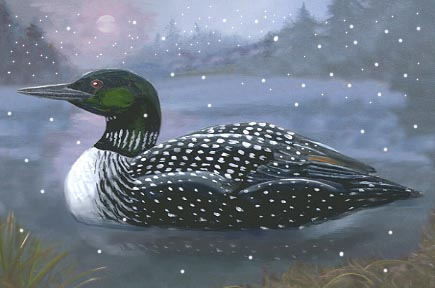
Dear Bird Folks:
I was walking along Nauset Beach early this morning when I heard several loons calling from just off shore. They didn’t look much like loons but they sure sounded like them. Do we ever have loons here in the winter? If so, why are they in flocks and why are they still calling?
-Donna, Orleans
Yes Donna,
Of course we have loons this time of year. We have loons every day of the year. In fact, if you look at your Cape Cod Bird Club’s checklist (you do have one don’t you?), you’ll notice that loons are listed as “common” birds all months, except of course for summer, when most wisely get out of town.
Many people are surprised to learn that loons are a common Cape Cod bird. We tend to think of loons as being a bird from northern New England, especially Maine. And Maine is happy that we have that impression, for they want everyone to believe they are the loon capital of the North East. Go to any shop in Maine and you’ll find loons on everything from mugs to underwear. The state even puts the loon on the license plate. For a while the most popular Maine plate was the image of a red cooked lobster. Remember that? But that fad faded as people got tired of gulls chasing their car down the road.
Loons breed on northern freshwater lakes, usually in front of the summer cottage of boastful people who feel the need to tell the rest of us all about it, every chance they get. Well, guess what? We have plenty of loons here too and we don’t have to deal with black flies. In your face Maine dudes!
When the lakes freeze up the loons head for the unfrozen saltwater. The major reason why some people don’t think we have many loons is that most of our loons aren’t those handsome breeding plumage loons we see in the nature magazines. The stereotypical loon plumage, with the distinctive checkered back, dark head, and striped neck collar, is gone by fall. Even their freaky red eyes turn dark.
Winter loons are not those majestic birds that strut about in front of the cottages of boastful people. Most of the time they are drab, solemn and solitary, looking more like a crabby old guy waiting for a bus, than the bird who once boldly modeled for a license plate. Why then are you seeing flocks of noisy loons if they are supposed to be quiet and solitary? Well, some writers might explain it by saying that loons are “odd ducks”, but they aren’t ducks, so you won’t hear that from me.
I think the key to your question Donna is the time of day in which you saw them. You said it was “early.” Often loons will flock up for protection at night and disperse singly for feeding during the day. Perhaps the flock that you saw hadn’t dispersed yet. Maybe they were all waiting for the first cup of coffee to take effect before they headed off for a fun filled day of being solitary.
Why are they still calling? Loons have a variety of weird, haunting calls, with each call being weirder and more haunting than the next. But they all translate into the same types of calls most birds make. There are some calls for attracting mates, territory defense, alarm calls, and some calls to communicate with other loons. Perhaps what you heard were simple communication calls to mark the start of the day. Or, since loons have a feeding territory, even in the winter, it is quite possible that one or two of the loons were telling the others to push off and find their own food.
A few years ago we heard alarm calls coming from a loon that was dodging cars in the nearby Stop & Shop parking lot. Often migrating loons mistake a wet parking lot for a lake. When that happens they are in big trouble, since they can’t take off from land. Fellow worker Jeff and I grabbed a box and ran out to save the loon. Only this loon wasn’t in the mood to be saved. Without flinching Jeff dove on the frantic and powerful bird and wrestled it safely into the box, while I bravely kept a keen eye out for any other loons that may have wanted to make a sneak attack. We then carried the angry loon to the Town Cove and let it go. As the loon swam away it called back to us, but I would rather not repeat what it said.